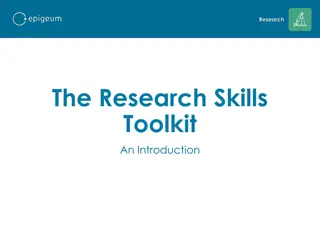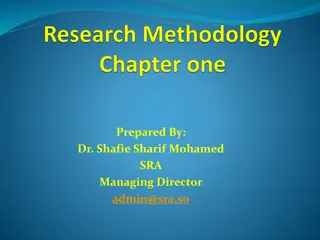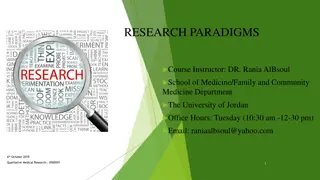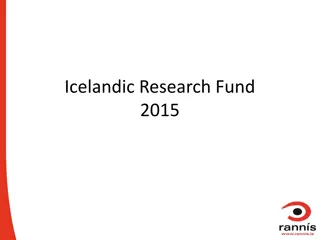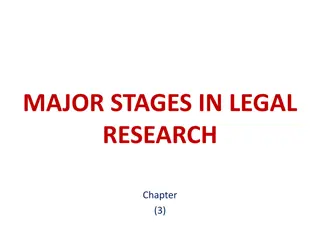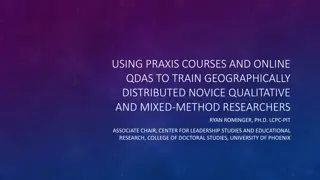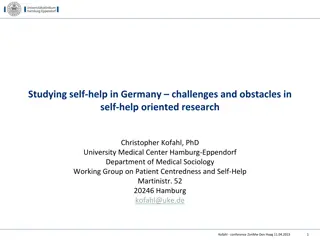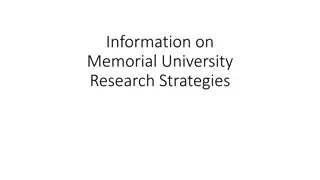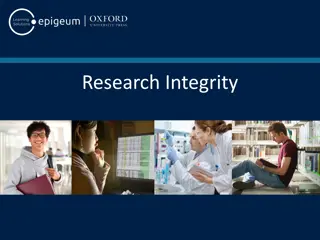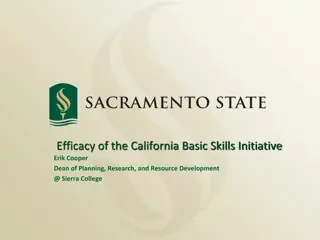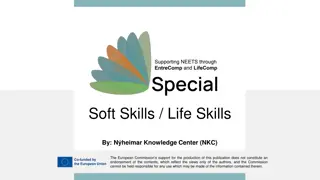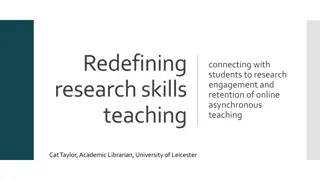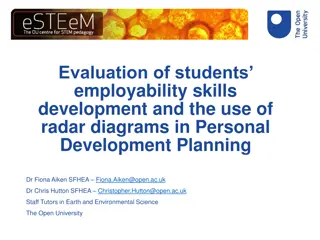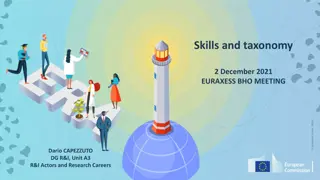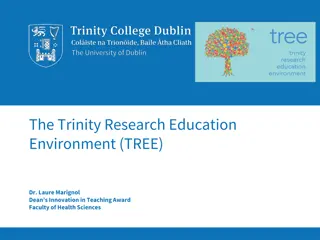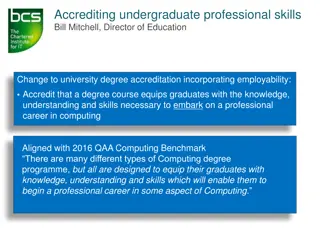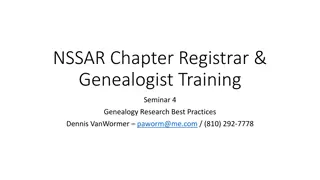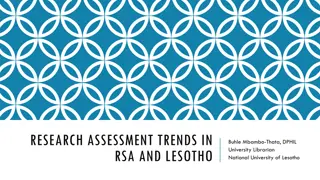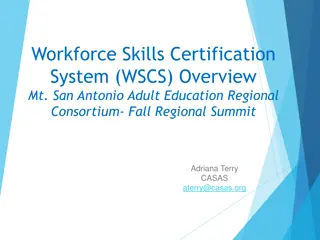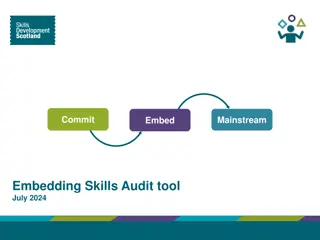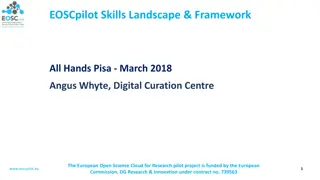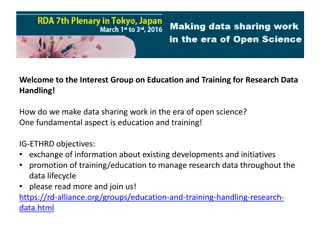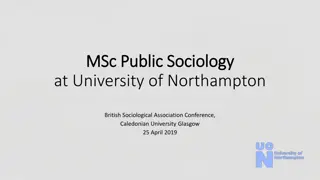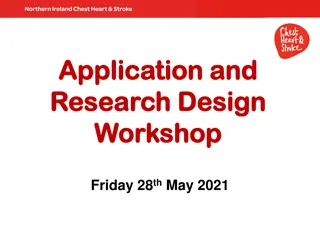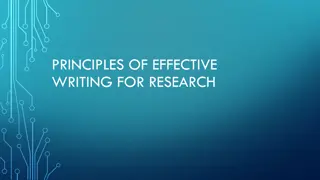Addressing Contemporary Challenges in Research Security Program Development
The Workshop to Inform Development of the Research on Research Security Program (RRSP) focuses on safeguarding the research enterprise amidst evolving global threats. Led by Dr. Rebecca Keiser and Dr. Shawna Cox, the program aims to balance security measures while maintaining an open and collaborati
3 views • 16 slides
Safeguarding Canada's Research: Policy on Sensitive Technology Research and Affiliations of Concern (STRAC)
Canada's new Policy on Sensitive Technology Research and Affiliations of Concern (STRAC) aims to protect the country's research ecosystem from foreign entities posing security risks. The policy restricts funding for projects involving sensitive technology research if affiliated with military or stat
1 views • 10 slides
Enhancing 21st Century Skills of Primary School Students through Improved Literacy
Students' 21st-century skills can be developed by improving literacy skills in reading, writing, speaking, and problem-solving. This study focuses on training teachers to enhance students' skills through a constructivist approach, project worksheets, and assessments in various subjects. Action resea
3 views • 7 slides
Understanding the Process and Types of Research Design
The process of research design involves interactive stages that occur simultaneously, leading to the designing of a research study. This includes steps in research design, classification of research design types, such as exploratory, descriptive, and experimental/causal research design. Each type se
12 views • 8 slides
Importance of Formulating Clear Research Problems
Addressing a research problem is crucial in research endeavors as it guides the process, helps in setting objectives, and determines the direction of the study. Formulating a well-defined research problem aids in understanding the research procedure, clarifying objectives, designing the research pro
14 views • 7 slides
UCC Research Support and Strategies Overview
UCC's Research Support, Policy & Strategy function, led by David O'Connell, PhD, provides comprehensive support for research activities at the university. The office manages research funding, monitors performance, and facilitates engagement with external stakeholders. UCC's involvement in Horizon Eu
3 views • 17 slides
Importance of Teaching Life Skills for Healthy Child Development
Life skills education plays a crucial role in promoting healthy child and adolescent development by enhancing adaptive behavior, problem-solving abilities, and social skills. It encompasses three core areas: thinking skills, social skills, and emotional skills. Teaching life skills is essential for
4 views • 15 slides
Enhancing Research Skills with Epigeum's Research Skills Toolkit
Epigeum, a leading provider of online courseware, offers the Research Skills Toolkit, comprising five core programs designed to equip postgraduate researchers with key skills and knowledge. Developed from the Research Skills Master Programme, the Toolkit integrates interactive learning design, user-
1 views • 9 slides
Effective Proposal Writing for Health Research
Learn about the fundamentals of research proposals for health-related studies, including defining research, understanding the purposes of health research, and exploring motivation for undertaking research. Discover the difference between basic and applied research, examine types of research, and del
1 views • 70 slides
Overview of Research Problem Identification and Formulation
Understanding the importance of defining a research problem, this content delves into the selection and formulation of research problems, the definition of a research problem, reasons for defining it, methods for identifying research problems, sources of research problems, and considerations in sele
1 views • 11 slides
Understanding the Essence of Research: A Comprehensive Overview
Research is a systematic pursuit of new knowledge, aiming to unveil hidden truths through data collection and analysis. This course outline delves into the fundamentals of research, covering topics such as types of research studies, importance of research, and distinctions between pure and applied r
3 views • 32 slides
Epic Tools for Clinical Research by Shara Power, RN, BSN, OCN
Explore Epic tools for clinical research developed by Shara Power, a skilled application developer specializing in EPIC Beacon Oncology at UIHC Healthcare Information Systems. Learn about managing research study records, investigational study medication orders, and the process for creating and using
0 views • 26 slides
Understanding Research Paradigms in Qualitative Medical Research
Delve into the world of research paradigms in qualitative medical research with a focus on the key differences between objective and subjective research, the meaning of research paradigms, components of research paradigms, types of research paradigms, and how paradigms guide the selection of researc
0 views • 42 slides
Guidelines for Selecting Research Project Topics in Environmental Health
Research is crucial for addressing environmental health issues. Choosing a good research topic is the first step towards effective research. This paper discusses the meaning, characteristics, types of research, and the research process to help in selecting appropriate research topics. Understanding
0 views • 15 slides
Comprehensive Research Training Programme in Social Sciences
Delve into the Research Training Programme offered by the Graduate School of Social Sciences, led by Professor Mark Tranmer. Explore the importance of research methods training, course offerings under the Research Training Programme (RTP), the Certificate in Social Science Research Methods (CSSRM),
6 views • 11 slides
Sector Skills Workshop: Updating Skills Plan and Economic Outlook
The Sector Skills Workshop focuses on updating the Sector Skills Plan for 2019-2020 and addresses key areas such as research methods, occupational shortages, SETA partnerships, and strategic skills priority actions. The workshop also delves into the economic and labor market outlook for the Wholesal
5 views • 15 slides
Icelandic Research Fund 2015: Enhancing Scientific Research and Education
The Icelandic Research Fund (IRF) aims to enhance scientific research and education in Iceland by awarding funding to research projects led by individuals, teams, universities, research institutes, and companies. Principal investigators must have completed graduate studies and experience in running
0 views • 22 slides
Understanding the Three Major Stages in Legal Research Process
Legal research involves a systematic three-stage process: research planning, research implementation, and presenting research findings. Each stage requires different skills and tasks, such as fact collection, legal analysis, problem identification, data analysis, and interpretation. The process incl
0 views • 36 slides
Enhancing Research Skills for Online Doctoral Students
Dr. Ryan Rominger discusses using Praxis courses and Online QDAS to train geographically distributed novice qualitative and mixed-method researchers. The presentation focuses on teaching research methods to doctoral students, incorporating practical skills, online QDAS software, and continuous impro
0 views • 26 slides
Challenges in Self-Help Research in Germany
Exploring the landscape of self-help research in Germany reveals various challenges and obstacles faced by researchers in studying self-help initiatives. The research delves into different aspects such as research scope, involvement of various groups, and the entities conducting research in this dom
0 views • 14 slides
Memorial University Research Strategies Overview
Memorial University's research strategies focus on attracting, retaining, and supporting researchers, fostering an environment of research excellence, engaging with community partners, and supporting fundamental and applied research. The university's strategic priorities include synergy in applicati
0 views • 11 slides
Comprehensive Research Integrity Programme for Researchers
Research Integrity Programme offering practical advice and professional guidance for researchers at all career stages. Led by renowned advisors and contributors, the program covers key aspects of research ethics and responsibilities, ensuring adherence to best practices throughout the research proce
0 views • 21 slides
Efficacy of the California Basic Skills Initiative by Erik Cooper
Detailed examination of the California Basic Skills Initiative led by Erik Cooper, highlighting the importance of basic skills in college success. The initiative focuses on foundational skills in reading, writing, math, and English as a Second Language, aiming to address the remediation needs of a s
0 views • 34 slides
Soft Skills and Life Skills Overview
Soft skills, also known as life skills or people skills, encompass interpersonal and social abilities that enable effective interaction with others. They are acquired through daily life experiences and reflections, in contrast to hard skills gained through formal education. This overview delves into
0 views • 36 slides
Redefining Research Skills Teaching for Online Engagement and Retention
The University of Leicester's Academic Librarian team explores the impact of research skills teaching on students through the Library Champions scheme. Led by Cat Taylor, they developed an online learning activity to assess the retention and application of research skills. The project involved Stude
0 views • 18 slides
21st Century Labour Market Competences Workshop Insights
Explore the importance of skills in the 21st-century labor market, focusing on research on desirable skills and educational methods. Delve into discussions on future workforce education, school systems, soft skills, and desired employee competences. Discover key skills sought by employers and the si
0 views • 7 slides
Evaluation of Students' Employability Skills Development Using Radar Diagrams in Personal Development Planning
This study focuses on assessing students' employability skills development through the use of radar diagrams in Personal Development Planning (PDP). The research evaluated students' self-assessment and reflection on skills improvement with a specific focus on collaborating with others and self-refle
0 views • 18 slides
European Framework for Research Careers and Skills Taxonomies
The European Framework for Research Careers aims to synergize with the European Education Area and employment policies, recognizing and enhancing talent in research. It emphasizes brain circulation, intersectoral mobility, and training development. The initiative includes developing a Competence Fra
0 views • 9 slides
Trinity Research Education Environment (TREE) - Dr. Laure Marignol's Innovative Teaching Approach
Dr. Laure Marignol, from the Faculty of Health Sciences at Trinity College Dublin, developed the Trinity Research Education Environment (TREE) to enhance research skills among students. This innovative program focuses on interactive learning activities and a structured approach to research, aiming t
0 views • 11 slides
Accreditation Evolution for Computing Degree Programs
Bill Mitchell, Director of Education, proposes an evolution in university degree accreditation to incorporate employability skills for graduates pursuing professional careers in computing. The accreditation process emphasizes aligning with national skills criteria, engaging employers, and recognizin
0 views • 16 slides
Genealogy Research Best Practices and Tools
Explore best practices and resources for genealogy research, including BCG Process Standards, DAR Genealogical Research System, SAR Patriot Research System, Ancestry.com, Familysearch.org, and more. Learn about planning research, collecting data, and reasoning from evidence to effectively trace your
0 views • 20 slides
Research Assessment Trends in RSA and Lesotho: Issues, Challenges, and Forward Strategies
Research assessment in RSA and Lesotho involves evaluating research quality, measuring inputs, outputs, and impacts using both qualitative and quantitative methodologies. The prevailing practices include assessing research productivity for progression and utilizing various assessment mechanisms to e
0 views • 7 slides
Role of Research Nurses in Advancing Evidence-Based Practice in Nursing
Research nurses play a crucial role in advancing evidence-based practice in nursing by conducting systematic inquiries to validate existing knowledge, develop new skills, and solve nursing problems. This overview discusses the importance of research in nursing, the significance of evidence-based pra
0 views • 21 slides
WSCS - Workforce Skills Certification System Overview
The Workforce Skills Certification System (WSCS) aims to help learners transition into the workforce by developing and certifying their work readiness skills valued by employers. Through a three-step process, learners can profile, develop, and certify their skills to increase employability. The syst
0 views • 27 slides
Embedding Skills Audit Tool: Self-Evaluation Guide for Establishments
The Embedding Skills Audit Tool is designed to help establishments self-evaluate their skills approach against illustrative statements for the commit, embed, and mainstream stages. This tool provides guidance on scoring, focused discussions, and action planning to enhance skills implementation. By f
0 views • 7 slides
Understanding Competences, Skills, and Stewardship in Research for the European Open Science Cloud
The European Open Science Cloud pilot project aims to link competences, skills, and capabilities for stewardship in research. It explores the connection between competences, capabilities needed by research teams for the EOSC environment, and skills required for open data science. The importance of s
0 views • 19 slides
Enhancing Data Handling Skills in Research Professions for Open Science Era
Explore the Education and Training Interest Group focusing on data sharing in the open science era. Learn about competencies required for research data handling in various professional areas like research librarians, administrators, infrastructure managers, and researchers. Discover essential skills
0 views • 6 slides
MSc Public Sociology: Fostering Sociological Skills for Social Impact
The MSc Public Sociology program at the University of Northampton aims to advance the study of social issues, enhance communication skills for engaging in public debates, apply sociological knowledge to address complex problems, and develop diverse transferable skills. It emphasizes the use of media
0 views • 6 slides
Exploring Research Design and Funding Priorities in Northern Ireland
Dive into the world of research at the upcoming Application and Research Design Workshop scheduled for Friday, 28th May 2021. Discover the strategic priorities driving impactful research initiatives, learn about current research projects, funding processes, and collaborations. Explore the rich histo
0 views • 37 slides
Writing Research Papers Effectively: Guidelines and Steps
Effective writing for research involves developing a good research idea, writing a literature review, and understanding the key elements of writing research articles. This process includes coming up with a strong research question, gathering relevant information, creating an outline, writing the dra
0 views • 26 slides







